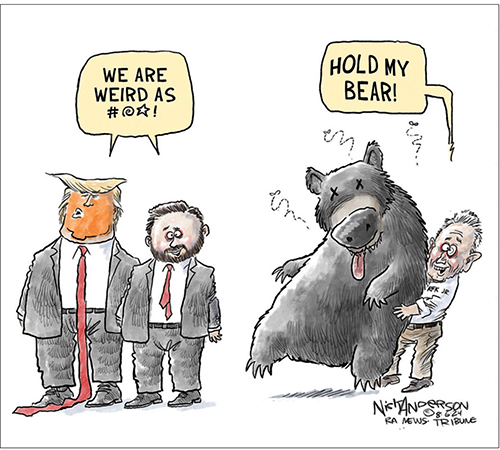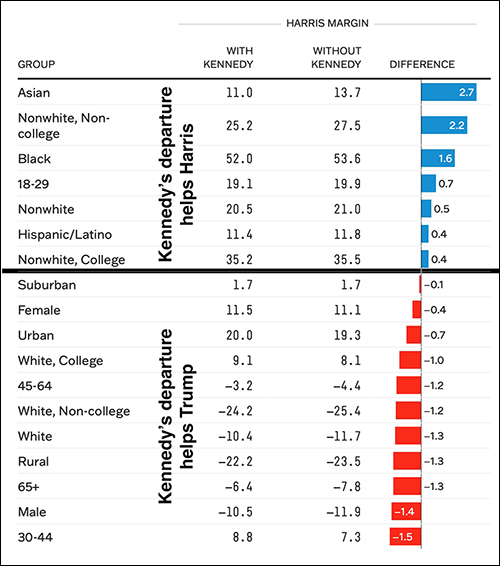

On Friday, as expected, Robert Kennedy Jr. dropped out of the race and endorsed Donald Trump on the way out the door. Why did he do this? First, he plunged from 15% in the polls in July to roughly 4% now and he was still dropping. If he actually believed he was going to get 15%, he was smoking something and inhaling it, too. Third parties don't get above 4-5% except under very unusual circumstances—e.g., you are Ross Perot, with a billion dollars you can dump in your campaign. This year there were double haters, but that is a thin reed to cling to. In the end, few people want to waste their vote to make a statement that nobody is going to hear.
We think "weird" has a good shot at winning the "Word of the Year" award. And Kennedy's campaign had more than its share of it. Here are some of the highlights:
The last one of these gave rise to people (and cartoonists) mocking him:

Kennedy's brothers and sisters are beyond furious with him. For example, sister Kerry Kennedy said: "Our brother Bobby's decision to endorse Trump today is a betrayal of the values that our father and our family hold most dear." Other comments from his family were just as harsh, if not more so. Jack Schlossberg, JFK's grandson, tweeted: "RFK Jr. is for sale, works for Trump. Bedfellows and loving it."
That brings up the question of: Did Kennedy make a deal with Trump? For example, a cabinet post for an endorsement? If so, Kennedy is even more stupid than we think he is, and that is not easy. Trump would never honor such a promise. He doesn't want any loose cannons in his cabinet. He wants only 100% guaranteed loyalists. Kennedy is not a loyalist. In fact, lest we forget, Kennedy tweeted out a long anti-Trump screed exactly 3 months ago, which concluded like this:
Trump appointed the worst neocons to the highest positions of power in his administration: John Bolton, HR McMaster, and Robert O'Brien. Now, Lindsey Graham is one of his top advisors and likely to be his Secretary of State.
President Trump bombed Syria, killed an Iranian general, and failed to fulfill his promise of ending the war in Afghanistan.
President Trump invented lockdowns. He shut down millions of small businesses and facilitated the greatest wealth transfer to billionaires in this country's history.
President Trump did nothing to solve the opioid crisis. It got far worse under his tenure while his appointees running HHS were in the pocket of big pharma.
If you think a second Trump term would be any different, you are engaging in wishful thinking.
Kennedy is an opportunist, and a stupid one at that if he believes Trump will honor any deal they made. Kennedy's only slim hope is something like an ambassadorship to Lower Slobbovia.
Oh, and there's also this. Another person who is absolutely and totally against Kennedy's endorsement of Trump is actress Cheryl Hines, who just happens to have been married to Kennedy for the past 10 years. Are we now in a Lysistrata-type situation, or worse? She is taking quite a lot of abuse online, and there are rumors of an impending divorce. The ironic thing is that if Kennedy had challenged Joe Biden in the Democratic primary on a platform cloned from his father's 1968 run, he might just have gotten the nomination and won the presidency.
The €56,960 question [(V) is writing this post] is: What effect will Kennedy's withdrawal have on the race? The New York Times' Ruth Igielnik wrote an article precisely about this. Igielnik's primary job at the Times is managing the Siena College polling the paper sponsors. She makes up the questions and analyzes the results. She has 17 years' experience in survey research, including 10 years at the Pew Research Center.
She noted that some polls show Kennedy helping Trump but others show him helping Harris. In the recent Siena polls, if all the Kennedy supporters who self-identified as Republicans vote for Trump, that will net Trump maybe 1 point. On the other hand, Larry Sabato said: "Few people will vote for another candidate just because their candidate drops out and endorses someone else." Remember, people who support protest candidates do so because they detest the major party candidates. Will their candidate dropping out suddenly make either of the major party candidates acceptable? There is another option for Kennedy's supporters: Don't vote. There is also evidence that Kennedy's supporters were marginal voters to begin with and got interested in voting only due to an independent candidate becoming available.
FiveThirtyEight crunched its numbers to see what the Kennedy effect might be. They see that when Kennedy is not in the mix, Harris gains 1.3 points and Trump gains 1.5 points. This suggests that Kennedy's departure will cost Harris a net 0.2 points.
FiveThirtyEight also looked at the crosstabs. Below is Harris' margin over Trump with various demographic groups with Kennedy in the race and without Kennedy in the race as measured by recent polls. This chart does not take into account the possibility that some Kennedy voters may decide to sit this one out:

With seven demographics, Kennedy's departure helps Harris. The biggest gains are among Asian Americans who supported Kennedy, but without him support the Asian-American Harris. Trump's biggest gains without Kennedy are among voters 30-44.
Another political analyst who has weighed in on RFK Jr.'s departure is Ronald Brownstein. In this video he notes that Kennedy's "brand" is being an antivaxxer. Forty percent of Republicans now say that parents should be allowed to send their unvaccinated children to public schools even if it endangers other children. However, 70% of all Americans disagree. Brownstein thinks that among college-educated suburban moms, at least 90% disagree with the Republicans on this, and something that affects the health of their kids is going to be front and center for them. He also notes that while some young Black men may like Kennedy for not being a conventional politician, their turnout rate is 49%. In contrast, the turnout rate among college-educated white women is 82%. He also notes that in 2020, Joe Biden didn't hit the ceiling among white women. He got about 60%. Govs. Gretchen Whitmer (D-MI) and Josh Shapiro (D-PA) got 70% in their elections. Harris has room to grow here.
Brownstein's conclusion is that if Harris now brands Trump as an antivaxxer, whatever she loses with young Black men who don't trust government and vaccine mandates, she more than makes up with among white women, especially college-educated suburban white moms, who very much support vaccine mandates. He thinks that Kennedy's endorsement of Trump could well end up being a net negative by driving more white women to Harris.
It is also worth noting that Kennedy's name will be on the ballot in a few states. Some voters may not be aware that he dropped out and still vote for him. After all, if voting for him was merely a protest against the Democrats and Republicans, then voting for him still registers as a protest. As we know, Nikki Haley continued to get 20% of the votes in the Republican primaries, even after she dropped out. So not running is no barrier to getting votes.
We don't know how this will end (yet), but it sure looks like Kennedy went out not with a bang, but with a whimper. (V)